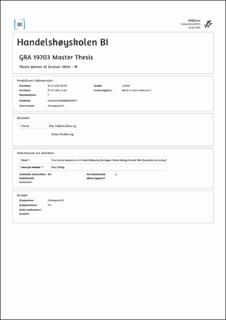Time Series Momentum: Is Trend Following Strategies Viable During Periods With Quantitative Easing?
| dc.contributor.author | Risa, Jim Nikolai | |
| dc.contributor.author | Stokkevåg, Stian | |
| dc.date.accessioned | 2022-12-19T10:46:43Z | |
| dc.date.available | 2022-12-19T10:46:43Z | |
| dc.date.issued | 2022 | |
| dc.identifier.uri | https://hdl.handle.net/11250/3038459 | |
| dc.description | Masteroppgave(MSc) in Master of Science in Finance - Handelshøyskolen BI, 2022 | en_US |
| dc.description.abstract | In regard to the economy following the financial crisis of 2008, we examine time series momentum within 53 financial instruments divided into four asset classes. Our thesis provides evidence of acute repercussions for time series momentum within all assets as a response to the increased correlation, both across- and within- asset classes, deriving from the implementation of quantitative easing. With coordinated movement in the market, fewer individual trends emerge leading to loss of diversification benefits, inferior price predictability and poor performance. As a result time series momentum strategies underperforms in comparison to the market and is, accordingly, unable to generate a significant alpha given the current market conditions. | en_US |
| dc.language.iso | eng | en_US |
| dc.publisher | Handelshøyskolen BI | en_US |
| dc.subject | finans finance finacial economics | en_US |
| dc.title | Time Series Momentum: Is Trend Following Strategies Viable During Periods With Quantitative Easing? | en_US |
| dc.type | Master thesis | en_US |
Tilhørende fil(er)
Denne innførselen finnes i følgende samling(er)
-
Master of Science [1621]
